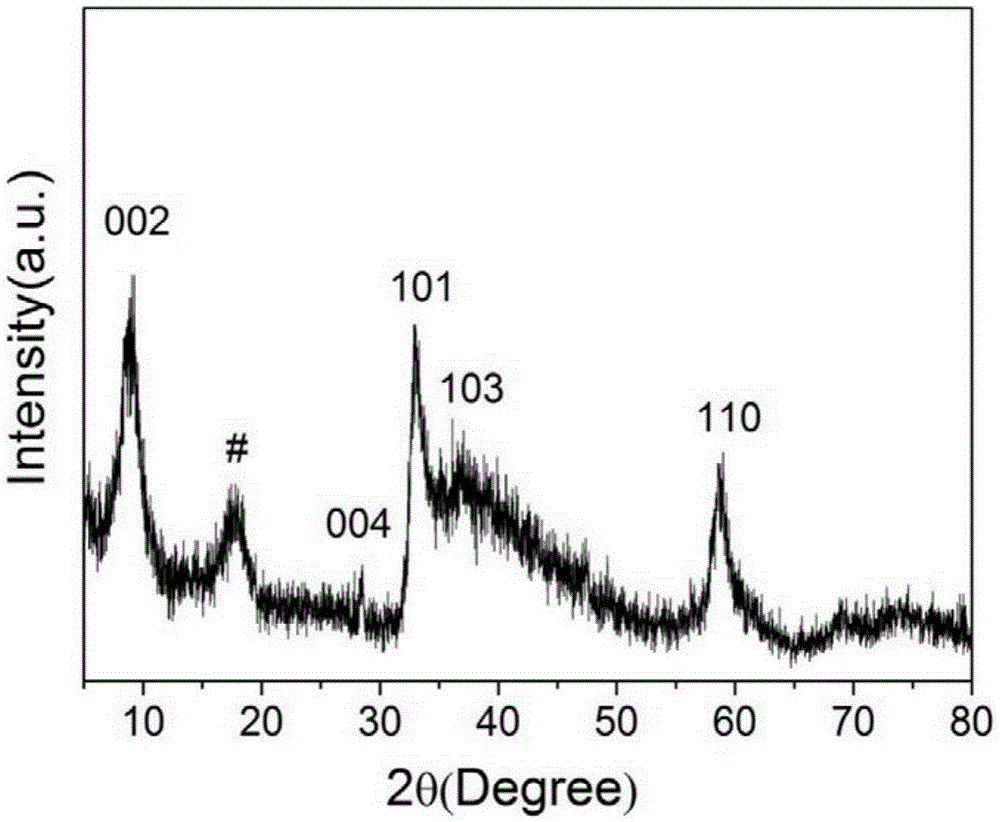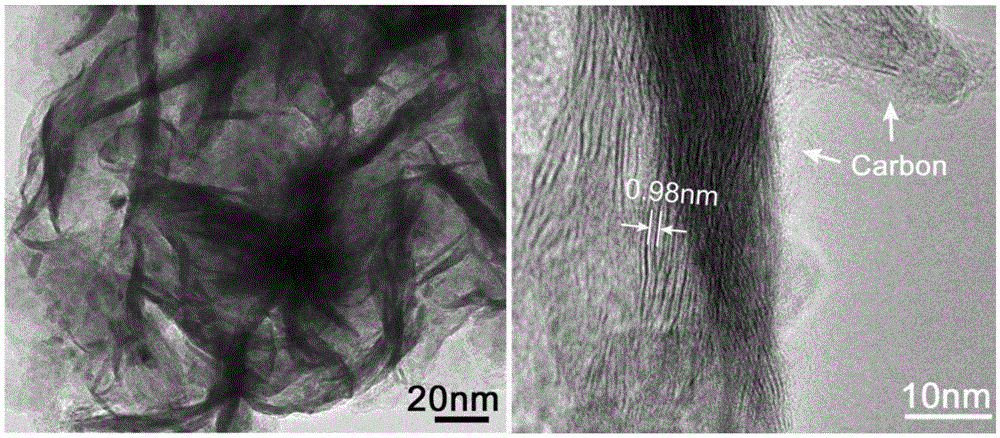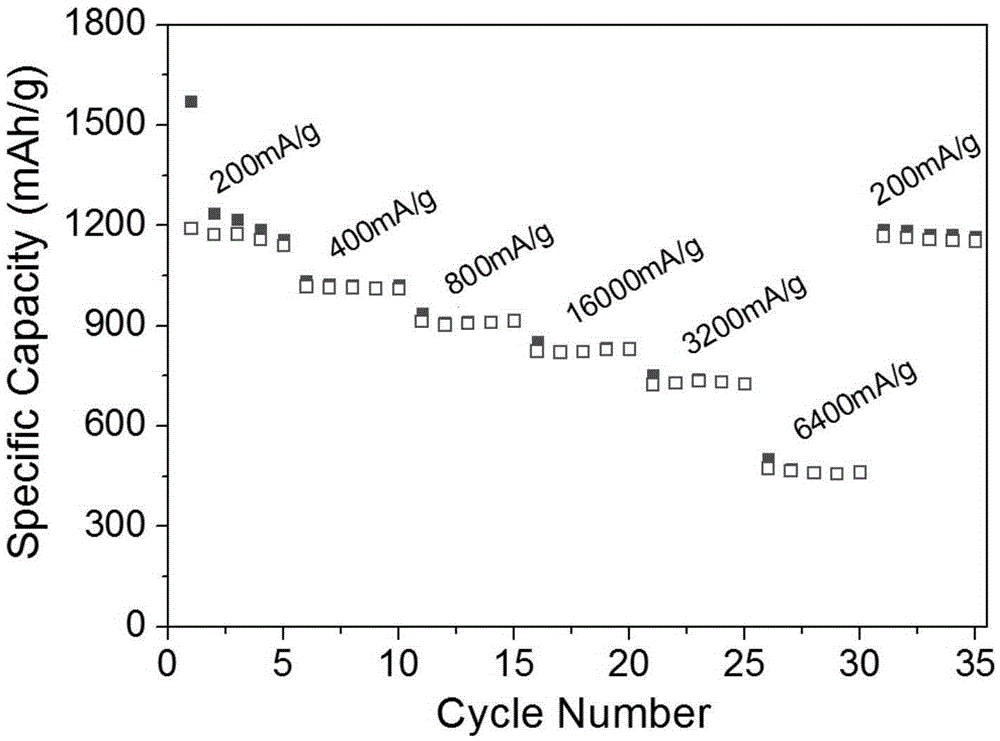A kind of molybdenum disulfide/mesoporous carbon composite electrode material and its preparation method and application
A technology of molybdenum disulfide and electrode materials, applied in battery electrodes, secondary batteries, circuits, etc., can solve problems such as limited electrochemical performance and low electronic conductivity, and achieve excellent electrochemical performance, improved conductivity, and high power performance effect
- Summary
- Abstract
- Description
- Claims
- Application Information
AI Technical Summary
Problems solved by technology
Method used
Image
Examples
Embodiment 1
[0023] Dissolve 1.5g of sodium oleate, 1.0g of sodium molybdate, and 0.9g of thiourea in a mixed solvent of 15ml of deionized water, 15ml of ethanol and 2ml of oleic acid, adjust the pH to less than 1 with nitric acid, stir evenly, and at 140 The hydrothermal reaction was carried out at ℃ for 24 h, cooled to room temperature, washed and the reaction product was collected.
[0024] Dissolve 0.2g of P123 in 200ml of water, then add 0.25g of tromethamine and stir to obtain a buffer solution, then disperse the above reaction product in 200ml of the buffer solution, cool to room temperature after ultrasonication for 30min, add 250mg of dopamine while stirring, The reaction was stirred at 10 °C for 3 h, and the reaction product was collected by filtration, centrifugation and washing.
[0025] The obtained product was carbonized at high temperature in an argon atmosphere, and reacted at 600 °C for 2 h to obtain a molybdenum disulfide / mesoporous carbon composite electrode material, th...
Embodiment 2
[0028] Dissolve 2g of sodium oleate, 1.5g of sodium molybdate, and 1.4g of thiourea in a mixed solvent of 20ml of deionized water, 20ml of ethanol and 3ml of oleic acid, adjust the pH to less than 1 with nitric acid, stir evenly, and heat at 160°C. The hydrothermal reaction was carried out for 30 h, and the reaction product was washed and collected after cooling to room temperature.
[0029] Dissolve 0.3 g of P123 in 300 ml of water, then add 0.5 g of tromethamine and stir to obtain a buffer solution, then disperse the above-mentioned product in 100 ml of the buffer solution, cool to room temperature after ultrasonication for 60 min, add 350 mg of dopamine while stirring, and 250 mg of dopamine. The reaction was stirred at °C for 16 h, and the reaction product was collected by filtration, centrifugation and washing.
[0030] The obtained product was carbonized at high temperature in an argon atmosphere, and reacted at 850 °C for 34 h to obtain a nano-hybrid material with mesop...
Embodiment 3
[0032] Dissolve 3.0g of sodium oleate, 2.0g of sodium molybdate, and 2.0g of thiourea in a mixed solvent of 30ml of deionized water, 30ml of ethanol and 2ml of oleic acid, adjust the pH value to less than 1 with nitric acid, stir well, and set it at 180 The hydrothermal reaction was carried out at ℃ for 36 h, and the reaction product was washed and collected after cooling to room temperature.
[0033] Dissolve 0.6g of P123 in 600ml of water, then add 0.75g of tromethamine and stir to obtain a buffer solution, then disperse the above-mentioned product in 200ml of the buffer solution, cool to room temperature after ultrasonication for 90min, add 500mg of dopamine while stirring, 40 The reaction was stirred at °C for 24 h, and the reaction product was collected by filtration, centrifugation and washing.
[0034] The obtained product was carbonized at high temperature in an argon atmosphere, and reacted at 900 °C for 4 h to obtain a nano-hybrid material with mesoporous carbon inte...
PUM
| Property | Measurement | Unit |
|---|---|---|
| diameter | aaaaa | aaaaa |
| thickness | aaaaa | aaaaa |
Abstract
Description
Claims
Application Information
 Login to View More
Login to View More - R&D
- Intellectual Property
- Life Sciences
- Materials
- Tech Scout
- Unparalleled Data Quality
- Higher Quality Content
- 60% Fewer Hallucinations
Browse by: Latest US Patents, China's latest patents, Technical Efficacy Thesaurus, Application Domain, Technology Topic, Popular Technical Reports.
© 2025 PatSnap. All rights reserved.Legal|Privacy policy|Modern Slavery Act Transparency Statement|Sitemap|About US| Contact US: help@patsnap.com



